
28 minute read
From the Desert
This is the way; walk in it
I’ve started to read Ralph Martin’s book, The Fulfillment of All Desire: A Guidebook for the Journey to God Based on the Wisdom of the Saints. I thought it was going to be a quick read, but I have discovered it is one of those, ‘read a few pages, highlight certain passages, scribble notes, set it aside and pray for awhile’ type of books.
In his Introduction, Martin quotes from Isaiah 30:20-21. “The Lord will give you the bread you need and the water for which you thirst. No longer will your Teacher hide himself, but with your own eyes you shall see your Teacher, While from behind, a voice shall sound in your ears: ‘This is the way; walk in it,’ when you would turn to the right or to the left.”
Now you might think this is a strange association of thoughts, but as I contemplated this verse, it came to me that this is pretty much like taking Anna on a walk. I am Anna’s pack-leader in dog-terms. She needs to follow me where I want to go. I lead. If she starts going in one direction, or sees a rabbit and wants to chase it (which happens every day) I give a correction with the leash and a sound communicating where she needs to walk. I do this to reinforce to her I am the pack-leader. She is not. I also do this for her safety and well-being. Sure, there are times when we chase rabbits for play, but only after she has got her “business” and exercise time done. She does not resent this or hold a grudge, she is a dog after all. But she does know that from experience she will receive praise and a treat or two if she listens to my voice: “Anna, this is the way to walk, walk in it.” It helps her/us to achieve a “Union” of sorts.
What do dogs desires the most? I think they seek to please their masters and to share in some portion, their lives with us, some sort of Union. What should we humans desire the most? Easy to answer: We should desire Perfect Union with God. We should desire, above all things, as Jesus said in his Sermon on the Mount in Matthew 5:48, “Be Perfect, just as your heavenly Father is perfect.” We need to listen to his voice, hearing if He wishes us to go “to the right or to the left.” He desires to lead us to perfection. He desires for us to have ever-lasting Union with Him.
But Perfection? Isn’t Jesus asking us to achieve the impossible? Of course it is impossible if we try to achieve this on our own. Therefore striving for perfection, Perfect Union with God, must be done with God’s assistance; “for with God nothing will be impossible” (Luke 1:37). It is not impossible with God’s aid to convert our lives and make us Saints, to bring us to “perfection.” What does “perfection” mean? Martin says in his very first paragraph in his first chapter; “Perfect in purity of heart, Father Gabriel Landis perfect in compassion and love, perfect in obedience, perfect in conformity to the will of the Father, perfect in holiness.”
In his writing, Martin mixes in both the Saints who were mystics, but also the teaching of Pope John Paul II. In his Apostolic Letter, Novo Millennio Ineunte, (Beginning of the New Millennium) John Paul II wrote, “The time has come to repropose wholeheartedly to everyone this high standard of Christian living: the whole life of the Christian community and of Christian families must lead in this direction” (NMI, 30, 31). Pope John Paul was commenting on “Be perfect, just as your heavenly Father is perfect.” In other words; Be Holy. A good question for us to ponder is: “What do we mean by ‘holiness?’” I like Martin’s answer: “To be holy is not primarily a matter of how many Rosaries we say or how much Christian activity we’re engaged in; it’s a matter of having our hearts transformed into a heart of love.” So many times in the Gospels we read something like, “Jesus went off into the wilderness/desert to be alone and pray.” He did this because he understood that prayer transforms our hearts into hearts of love, deep love. John Paul wrote in NMI; “prayer can progress, as a genuine dialogue of love, to the point of rendering the person wholly possessed by the divine Beloved, vibrating at the Spirit’s touch, resting filially within the Father’s heart” (NMI 33). The directive of Jesus to, “Be perfect, just as your heavenly Father is perfect,” is not optional for us if File Photo we desire to make it to heaven. We either obtain Union with God through prayer, making use of the Sacraments, expanding our hearts into hearts of love, or we don’t. The former leads us to everlasting joy and love in heaven. The latter simply does not. If we are not striving to be Holy, we will not have Union with God.
I guess that is enough for this column. If you can, get this excellent book, then read and pray, and listen for the voice which tells us “This is the way; walk in it,” when you would turn to the right or to the left.”
Praised Be Our Savior Jesus Christ! Now and Always! Amen!
KANSAS MONKS Fresh from the vine...
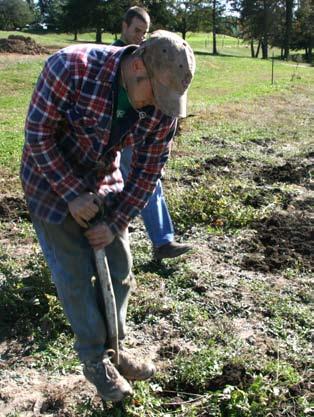

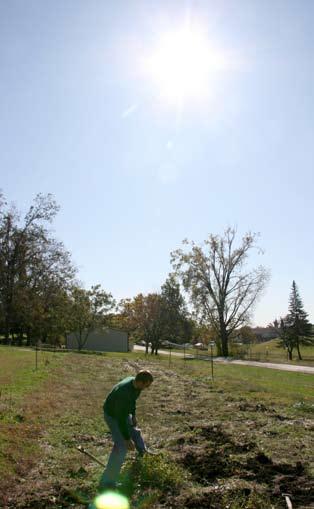

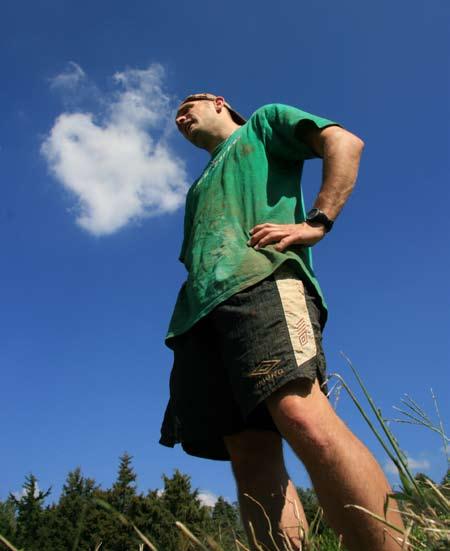
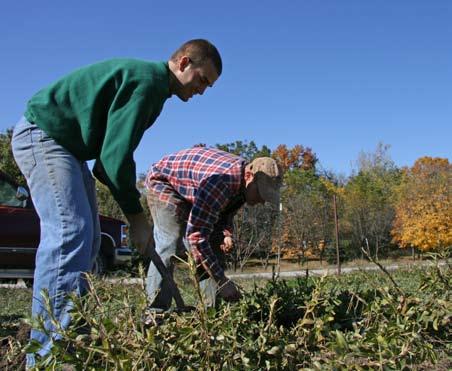

Peanuts? In Kansas? Will they even grow here? No, not really, Brother Leven Harton answered. The growing season is too short. The muddy, clay soil, too dense. Peanuts need loamy, sandy soil and a long, southern growing season. But then a crooked smile crossed the young monk’s face and his eyes took on a mad scientist gleam. “I just love peanut butter,” he said. The seed was already in the ground. During last year’s planting, nature stymied him; deer ate all the plants. “From the hoof prints,” Brother Leven recalls, “you would have thought they were having a prom out there.” But this spring, he got lucky. Brother Leven figures since there was no late freeze there were plenty of other plants for the deer to munch on. They took it easy on the Abbey peanut patch. He planted 1,500 seeds, 800 of which were donated by an uncle from Western Kansas who was amused by his nephew’s Quixotic quest. Three hundred broke the surface as plants. “What I really had was this weed farm with a few peanuts here and there,” Brother Leven joked.
A late October harvest resulted in about 10,000 worthwhile peanuts, enough for peanut butter for the Abbey table and peanut brittle for the Christmas holiday. Lessons learned from this harvest he hopes will result in a more abundant harvest next year. Out of the 1,500 seed planted, 100 were pure bred and the rest were hybrids. Of the open pollenated seeds 80 percent to 90 percent became plants. Brother Leven will be planting mostly pure-bred seeds next year.
The only question remaining is smooth or chunky?
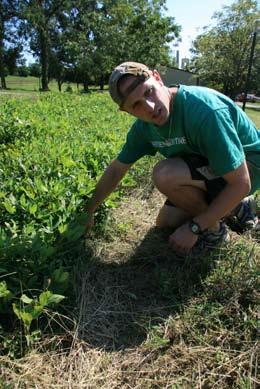
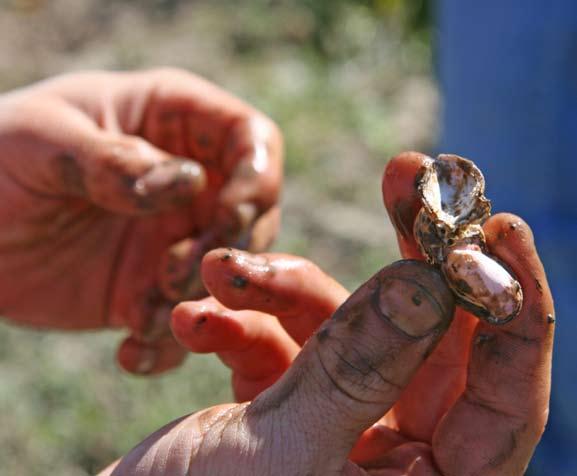
KANSAS MONKS Clothed with Faith God’s Will In Our Lives
The Radical Call
During the final two weeks of September Abbot Barnabas traveled to Rome to participate in the Congress of Benedictine Abbots at Sant’Anselmo, the international house of studies for the Benedictine Order.
On Saturday, Sept. 20, the abbots took time from their scheduled meetings to travel to the small Italian town of Castel Gondolfo – the papal summer residence – for an encounter with the Holy Father. Taking St. Benedict as his patron following his election as pope, Pope Benedict’s affinity for the father of modern monasticism is well known. He has made many references to St. Benedict in his public addresses and writings. Pope Benedict, a native of Bavaria—to which the roots of our monastery extend—early on in his priesthood and during his visits home from Rome would retreat to Benedictine monasteries in his homeland.
In this particular address to the abbots at Castel Gondolfo, Pope Benedict spoke of how important Benedictine life is to “a world and epoch marked by a disturbing culture of emptiness and meaninglessness.” The Holy Father spoke of our radical call as monks to make our lives in the monastery a “daily encounter with the Person of Christ, whom you always have with you as guest,
companion and friend.” To this point, our call as Benedictine monks is a radical call from the world, a radical call to a daily, incessant prayer, a call to “proclaim the primacy of God without compromise.” Pope Benedict reminds us, in his address to the abbots, how important the monk’s prayer is Prior James Albers for the Church and the world, how important is our “commitment to personal and communitarian sanctification.” It is a simple gift to the Church and world, but a radical one. It is a balance of Ora et Labora, “Pray ‘It is a balance of Ora et and Work,” that the Holy Father Labora, “Pray and Work,” sees as so vital to our world. It is that balance that is so vital to that the Holy Father sees the extended Benedictine Community we have formed in Atchison, in Northeast Kansas, and as so vital to our world. ’ beyond through the many lives we have touched and continue to form through our work in schools and parishes, and through the individuals who join us on retreat in the monastic setting. “There is a pressing need for vibrant places of encounter with the Lord,” Pope Benedict offered, “in which, through prayer and contemplation, the individual may recover peace with himself and peace with others.” It is that balance of interior freedom we all seek by living in Christ. Pope Benedict understands how important this balance is in forming the lives of the faithful, young and old; however, he sees a fundamental urgency in our service as Benedictine monks to the young. “I know and deeply appreciate,” Pope Benedict shared with the abbots, “the generous and competent cultural and formative work carried out by so many of your monasteries, especially for the younger generations, creating an atmosphere of brotherly acceptance that favors a unique experience of Church. In fact, it is of primary importance to prepare young people to face their future and measure up to the many demands of society, having as a constant reference the Gospel message, which is ever timely, inexhaustible and life-giving.” This is our call as Kansas Monks, Benedictine monks of St. Benedict’s Abbey; however, as is the case throughout the Church, there is a need for more of us to meet this challenge. There isn’t a day that goes by where our monks laboring in our college, high school, parishes and chaplaincies aren’t providing spiritual direc-
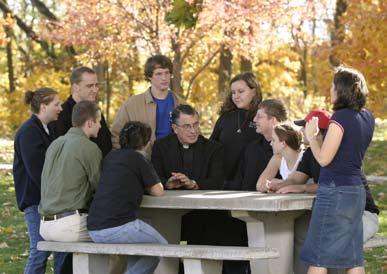
If you are a young man interested in a monastic vocation? If you know of someone who might be, please contact the St. Benedict’s Abbey Director of Vocations, Prior James Albers. He can be reached at jalbers@kansasmonks.org or by telephone at 913-360-7830
tion, aren’t hearing confessions, aren’t offering Masses, aren’t guiding our young people in ministry and the classroom, aren’t caring for the sick and dying. There isn’t a day when we aren’t providing for the welfare of one another temporally and spiritually in community. Nor is there a day where we fail to gather numerous times in community prayer, petitioning God for graces upon the Church and her people, or in personal prayer – meditation, lectio divina – to develop our own spiritual lives, to better help others in their growth toward God.
We each have a responsibility, monk and layperson alike, to instill in our young people an understanding of the importance and beauty of a life in service to God. In helping our young people who are discerning their vocations, it is important to ask them, “Is God calling you to direct service in his church?”
If you are not being called to join in our search for Christ in monastic life here at St. Benedict’s Abbey, then whom should you encourage to pray about it, to visit, to answer God’s call?
To our young people of faith, it is your responsibility to ask, “Is it I?” As parents of faith, you have a responsibility to ask, “Is it my son, how can I encourage him?” As grandparents, aunts, uncles, brothers or sisters, friends, “How can I support him in his discernment?”
Pope Benedict encouraged the abbots to ask those questions of our young people, and he pushes each monk to look inside himself to see if and how our lives are inspiring others to join us. “Indeed,” the Holy Father urged, “it is necessary to start with the new generations, offering them the possibility of coming into close contact with the spiritual treasure of the liturgy, of meditation and of lectio divina… A community capable of authentic fraternal life, fervent in liturgical prayer, in study, in work, in cordial availability to your neighbor who is thirsting for God, is the best impetus for inspiring in hearts, especially those of young men, the vocation to monastic life and in general a fruitful journey of faith.”
Editor’s Note: Father James Albers is Prior and Vocations Director of St. Benedict’s Abbey and a graduate of Benedictine College. All photos are Kansas Monks file photos
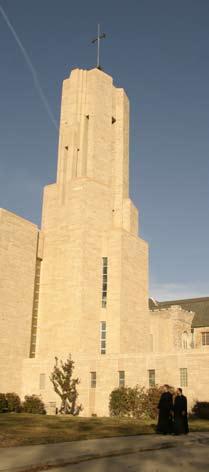
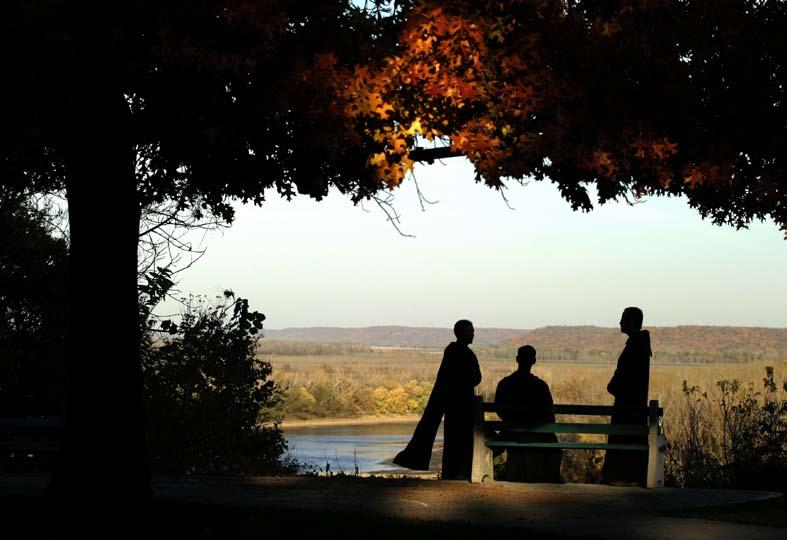
Marked with the sign of Faithc f
Father David Kinish (1902-1984)
A Father David is known for his devoted service in the Abbey Library, as Chaplain to the Sisters of Mount St. Scholastica Monastery for 38 years, and for his long-time cultivation of irises, and later, orchids. In fact, he discovered a new species of orchid in Brazil, the Orleanesia mineirosensis, which the Oakes Ames collection at Harvard University allowed him to name. Father David had a very dry sense of humor perhaps captured by this anecdote. One day in the Recreation Room he announced to Father Cornelius Caples the U.S. Navy had developed a clock that lost only a thousandth of a second each century. He suggested that Father Cornelius might like to Father David was an avid gardener. have one. Father Cornelius replied with an equally dry remark: that before he acquired one he would wait until the Navy worked out the “bugs.”
David was a quiet person no doubt fostered by his time alone with the irises in the garden or the orchids in the greenhouse. On his orchid-hunting trips in Brazil he took along a younger person to climb the trees and cut the specimens. Father David worked daily in the quiet of the library. He did have a masters in library science from the University of Michigan. The library was not as open as it is now during his tenure there. The college library did not have open stacks. One filled out a form, gave it to a worker, and the requested item was retrieved from the closed stacks, which were in the east basement
file photos
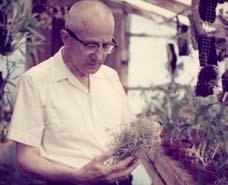
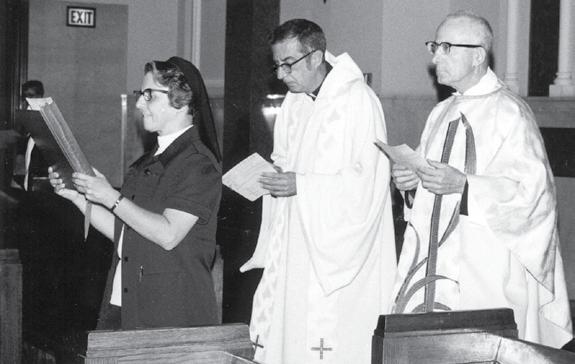
Sister Noreen Hurter carries the Lectionary at Mass followed by Abbot Owen Purcell and Father David/. Father David examines a Brazilian soy bean field with Brother Robert Heiman (left) and Father Eric Deitchman. (right)
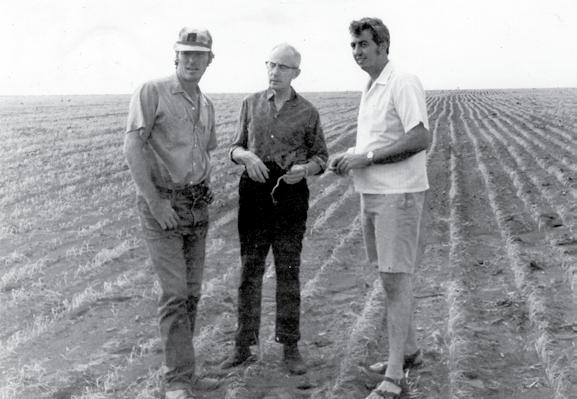
and second floor of what is now St. Benedict Hall.
The library work room was in the area where the Maybee Theatre is now located. The workers, mainly Father Colman Farrell and Father David, worked there under florescent lighting, in cassocks, and always fitted with green visors, much like poker players, to carefully catalog books and maintain the periodicals. Other community members did help on occasion as did student workers. There was a bookbinding area on the north end. Some monks tried their hand at that as well.
Father David is most prominently remembered as the long-time chaplain at Mount Saint Scholastica Monastery. Over the course of his tenure he gave thousands of homilies and heard as many confessions. Each day he was there for early Mass along with Father Felix and others who helped. He was revered by the sisters and was quick to remind us monks of how hard the sisters worked for the Abbey and the Church. Monetary recompense was often lacking or minimal.
The story is told of Father David’s dealings with one particularly noteworthy sister. He apparently was uncharacteristically brusk in his manner toward her. Her reply: “I’m finished with Kinish!”
Father Blaine Schultz has this reflection on the life of Father David: “One of my favorite monks! We had one thing in common, our love for classical music. He taped hundreds of radio broadcasts of classical music and shared them with me.
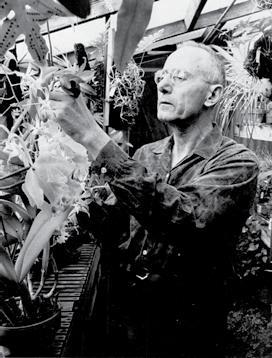
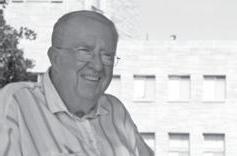
Editor’s Note: Abbot Owen Purcell is at work compiling a necrology of St. Benedict’s Abbey, a volume of brief profiles on each of the deceased members of the Abbey from its founding to the present. This document offers a thorough, poignant and often entertaining look into the history of the Abbey, one monk at a time. In order to provide our readers with some insight into the lives of the men who have made the history of St. Benedict’s, Kansas Monks will publish one or more of these profiles in each issue. If you have an anecdote about the monks you read about in these profiles or about any other deceased monks, Abbot Owen would enjoy hearing from you. You may contact him by telephone: (913) 360-7817, or more easily by e-mail: ojposb@yahoo.com.
KANSAS MONKS Wordin a

The following homily was delivered by Father Marion Charboneau at St. Benedict’s Abbey Church. All quotations are taken from the U.S. Catholics website www.usccb.org.
– Gospel: Matthew 20:1-16
I As part of my preparations for preaching this Sunday, I glanced at some of the remarks of the church fathers who wrote on today’s gospel passage, and found a nice thought from St. Jerome, presented to his readers as a statement from God himself about the value of receiving a day’s wages. Said St. Jerome: “A denarius bears the figure of the king. You have therefore received the reward I have promised you, that is, my image and likeness; what more could you desire…Take what is yours and go your way.” It’s a good quote with valuable insight into our eternal reward, yet, the dissatisfied workers in our gospel show it isn’t easy for everyone to simply accept and go their way.
Our Gospel presented a group of workers, probably symbolizing Christian Jews, resenting God’s generosity. How could people like the tax collectors and the prostitutes, who had gravely sinned against God, and the Gentiles, who had not born the full weight of Israel’s covenant for centuries, get the same reward as them?
The resentful workers first made an error in the way they conceived of salvation. They thought of it in terms of a calculation, some sort of measuring of the time they had labored for God, or a weighing of their contribution to the kingdom. They learned today through Jesus that our eternal reward is instead the measurement of God’s love for the sinner. The reward is the same, because God loves all in the same measure.
Christians may still wonder, then, if our actions and deeds have any lasting importance or significance in the kingdom. If the reward is the same, will what we do be noticed and remembered or will it be erased away once the End of the World arrives?
I will suggest that something of the answer to such questions becomes evident if you have ever compared two quarters in change you received from a pop machine. Perhaps one was minted recently, but the other, many years ago. Each possesses an equal value to whomever we hand them, yet each has a different shine.
Yesterday evening, the monks listened to an explanation of this gospel reading from St. Augustine that uses the same idea to explain the kingdom of heaven. He noted that all of the saints will shine, some more, some less. Some will shine with wedded chastity, others with virgin purity. Some will shine with good works, and others with the crown of martyrdom. To use his exact words, “Alike without end they will live, though each shall live in his own brightness.”
In light of all of this, we have to conclude that though our reward is the same, what we do here really will shine brightly in the heavenly kingdom. Take heart if you are the kind of person who gets anxious wondering if Father Marion Charboneau what you do will have any real meaning or outcome. In the end, it most certainly will.
The question I would direct to everyone here today, though, in light of the gospel is a simple one: Why would we wait even a moment to claim our reward? We quite obviously should do as Isaiah the prophet said in the first reading: “Seek the Lord while he may be found, call him while he is near.”
Isaiah was speaking at the time to a laughingstock, a people carried off to exile in Babylon, who’d lost their king and saw their temple destroyed. To people of that day and age, to be without a king was to be without greatness and with no one to lead the worship and obedience to the gods that every nation depended upon. To have no place of worship, was to have no home, and to be entirely abandoned and forgotten by the gods. We could sum it up this way: No king, No temple, No people. Not a nation, but trash thrown away.
Knowing that God’s ways are not the ways of humanity, and knowing that there might still be some hope because of the covenant they had once made with God, Isaiah urged this devastated people to “Seek the Lord” with a repentant heart. God proved Isaiah correct. Seemingly abandoned without temple or king, God restored them through a pagan king of all things, Cyrus of Persia, Conqueror of Babylon. King Cyrus let them go home. He let them rebuild the temple. Seemingly left for dead by the Lord, they were restored as God’s servants, the covenant people chosen to bring God’s promises to fulfillment and his blessing to all humanity. And from all of that would someday come their king.
We gather here today knowing that Jesus Christ is the Salvation Who Came from the Jews. He is the one who took up the task of his people to bring blessing to all humanity and brought it to absolute fullness in his Death and Resurrection, with no possibility of lack or privation. We gather here also as the people in the eleventh hour of salvation history, called to conversion and communion. Will we respond to that call with the repentant heart that seeks the Lord? Will we offer our lives in the Eucharist of the New Covenant? If there is any doubt or hesitation within us, may we remember the denarius, a small reminder of our reward. It is a small, shiny token. It bears the image of the king. It is a sign given by the one who out of his unimaginable love, will grant to us a share in his own inconceivable glory.

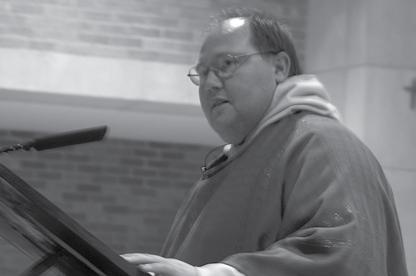

KANSAS MONKS Oblates
Find the healthy solitude of Advent
All of those in charge of getting “Kansas Monks” to your mail boxes have challenged me to write something to help prepare us for that great event, the Incarnation of Jesus Christ.
The old story really is always new and I hope to give you a few ideas on how to better prepare during this Advent.
It is my firm belief that Advent can indeed be one of the most fruitful spiritual times each year if we can simply shut out some of the activities around us. Yesterday we celebrated St. Bruno and his great love for solitude. How can we find some solitude in our life? There is only one way and that is to set time aside for it.
There is healthy solitude and there is also non-healthy solitude.
Healthy solitude is being able to spend time growing in that great love affair that challenges all Christians to fall more and more in love with God; to listen with the ear of our heart to what may be said in those times of deep solitude. It doesn’t have to be a long period of time but it has to be time well spent.
A non-healthy solitude is that time we spend going over something that has happened in our past or some hurt we have experienced. In these times we are very quiet but we are basking in pain. All this does is simply reinforce our pain.
Let us spend time with healthy solitude this Advent, attempting to grow more and more in our love with a God who gave us his only Son. That is some statement. For where else do we find God, out of pure love, becoming one of us. That is some Christmas present. Maybe we need to be on the top of our Christmas list and realize what a gift of love each of us has received. Men and women have ‘The old story become holy throughout the ages, and really is always we call them saints. Some new... ’ of these saints are celebrated on special days and the greatest of all, the Blessed Virgin Mary, is celebrated many times during the liturgical year. However, Christ is God, and out of love for every one of us he became a human being like unto us all. We have heard all of this many times before but let us strive to believe it this Advent season so that the Incarnation can be our special Christmas gift. A few suggestions might be appropriate: 1) Set aside some period of time each day during Advent to pray. Pray to know and understand the love of God for us. Clear out thoughts of what to buy or what cards to send. Love God more and more. 2) Read some Scripture every day. The Acts of the Apostles is always a good place to begin, as
Brother John Peto Director of Oblates
it tells the story of how the first Christians lived, but also delves into portions of some of the prophets. Also try certain chapters of Isaiah. Don’t read straight through a book; read here and there and maybe the passages will come alive in your life. 3) Plan your Christmas cards in such a way that you write a few every day rather than waiting to do them all at once. Try to send just a little something personal in each one. A few lines mean so much to others. In this day and age of emails and left messages, handwriting is a gift in itself. 4) If you buy presents and have to wrap them say a little prayer for the recipient of each package as you do so. 5) Take time to spend with family members and be present to one another.
A blessed Advent and a joyfilled Christmas day and all of the days of Christmas that follow until the Feast of the Baptism of the Lord. Don’t end Christmas when it should be beginning. Dare to be different from the world in which we live.
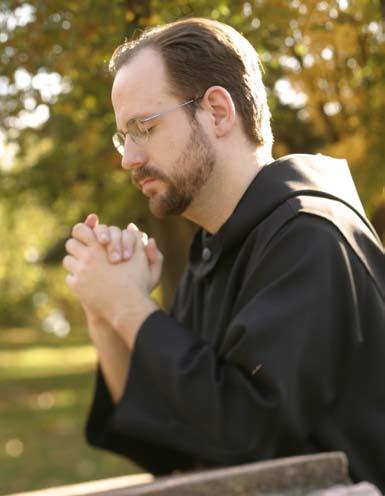
- Have you ever considered becoming an Oblate of St. Benedict? - Does it mean I make vows? Do I have more prayers to say? Does it cost money? - Do I have to make radical life changes? Come and see or contact me, Br. John Peto, jpeto@kansasmonks.org 913-360-7896

Jubilarians
monks celebrating anniversaries
Four monks of St. Benedict’s Abbey celebrated jubilee anniversaries this year.
Father Louis Kirby celebrated 60 years of priesthood. Father Louis, born July 29, 1922, in Boulder, Colo., professed his vows as a monk of Holy Cross Abbey in July 1944 and was ordained May 22, 1948. For much of his early monastic life he was either being taught or teaching, receiving his master’s degree at the University of Notre Dame and teaching and coaching sports in various positions in the Diocese of Pueblo.
From 1971 through 1977 he served as administrator of Santiago Apostel, Chapantongo, Hidalgo, Mexico, and then was pastor at St. Benedict in Floren, Mexico, for the following two years, before returning to Boulder, Colo., where he served as pastor of Sacred Heart Parish until 1985.
Father Louis served as chaplain and pastoral director of Fitzsimone Army Medical Center for seven years before returning to pastoral ministry. He came to St. Benedict’s Abbey in 2004 when Holy Cross Abbey closed, and was accepted as a member on June 8, 2005.
Abbot Barnabas Senecal celebrated the 50th anniversary of his profession to monastic life.
Abbot Barnabas, who graduated from Maur Hill Prep and St. Benedict’s College professed his vows to St. Benedict’s Abbey July 11, 1958, and was ordained to the priesthood May 30, 1964. He was elected the eighth abbot of St. Benedict’s May 30, 1994, and re-elected in December 2002.
Abbot Barnabas earned his master’s degree in educational administration at Emporia State University, and put it to good use as assistant headmaster (1969-1979) and headmaster (1979-1990) of Maur Hill. He also taught social studies and religion at Maur Hill from 1966 to 1989. Abbot Barnabas served as interim grade school principal for a year during his four years as associate pastor at Holy Spirit Parish in Overland Park in the early 1990s.
From 1971 through 1990, the future abbot was director of Camp St. Maur. And during his time at Maur Hill, he directed the Alumi Club, directed publicity work and designed an intramural sports program.
Also celebrating his 50th anniversary of profession to monastic life this year is Father Benjamin Tremmel, pastor of St. Ann Parish in Effingham, Kan. and St. Louis Parish is rural Atchison County. Father Ben, who was born Aug. 26, 1937, in Sibley, Iowa, professed his vows July 11, 1958, and was ordained to the priesthood May 21, 1966.
Father Ben is serving in his first pastorate after long careers as a scientist and teacher. He earned a masters’s degree in zoology from the University of Texas and doctorate in plant physiology from Duke winter 2008 University and taught biology for nearly two decades at Benedictine College before becoming the Abbey’s novice master in the early 1990s and a year and a half later, in 1993, became chaplain to the sisters of Mount St. Scholastica. Although he was no longer on the paid faculty at Benedictine, he continued to direct students in scientific research until 1996. In 2002, Father Ben was assigned to St. Ann parish, while he continues to assist with pastoral duties at Mount St. Scholastica. He also teaches classes on the Psalms to the Abbey’s novices.
The Abbey’s fourth jubilarian is Father Daniel McCarthy, who celebrated his 25th year of monastic life.
Father Daniel, a native of Garden City, Kan., professed vows Aug. 15, 1983 and was ordained to the priesthood June 15, 1991.
He graduated from Benedictine College with a double major in philosophy and religious studies in 1985, the beginning of intense scholarly pursuit. After completing his Master’s of Divinity at St. John’s University in Collegeville, Minn., he was ordained and later served as pastor of three parishes between 1993 and 1999—St. Charles, Troy; St. Joseph’s, Wathena, and St. Benedict, Bendena.
Father Daniel completed his master’s degree in theology, studying liturgy, at the University of Notre Dame in 1999, and then continued to pursue advanced studies in liturgy at Sant’ Anselmo in Rome.
He completed a license in sacred liturgy (S.L.L.) at the Pontifical Institute of Liturgy in 2005, and a doctorate of sacred liturgy (S.L.D.) there in 2008.
He currently lectures on liturgy at the Pontifical Beda College in Rome, and is co-founder and co-director of the book series Liturgiam aestimare: Appreciating the Liturgy. Father Daniel also continues to write a weekly column, “Listen to the Word,” for The Tablet of London.
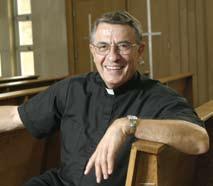
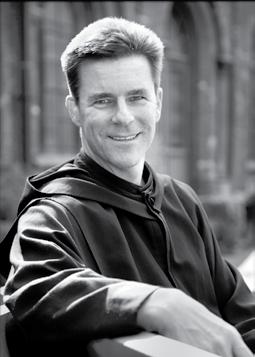
Other monks who celebrated significant anniversaries this year include
Profession
Brother Anthony Vorwerk 55 years Father Maurice Haefling 45 years Father Matthew Habiger 45 years Father Hugh Keefer 45 years Father Rodrigo Perissinotto 10 years Father Marion Charboneau 10 years Father Gabriel Landis 10 years Brother Jeremy Heppler 5 years



